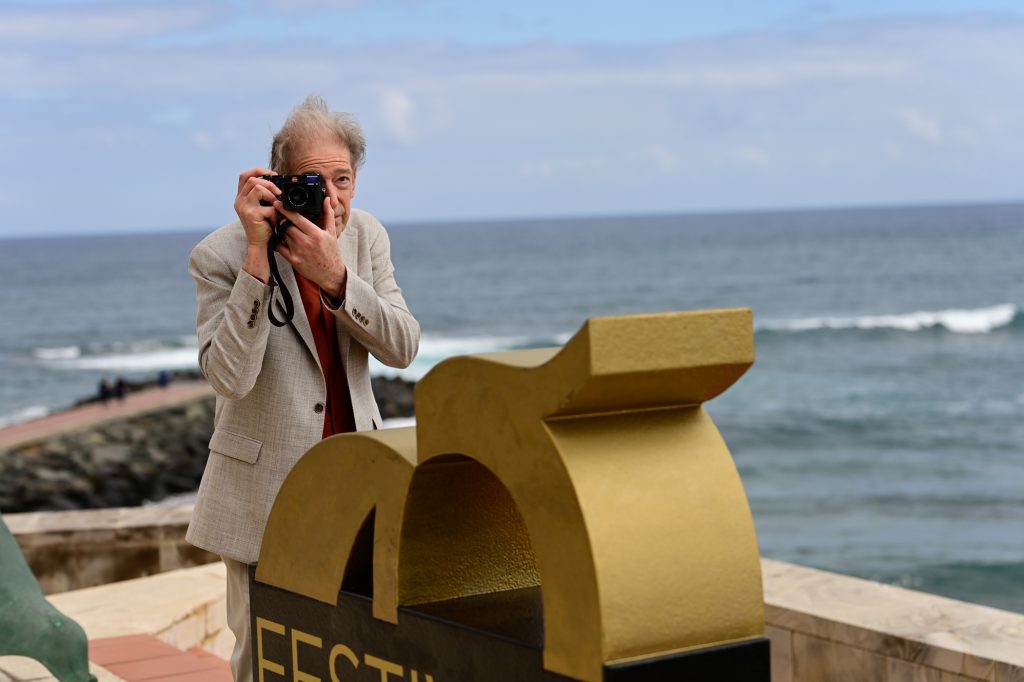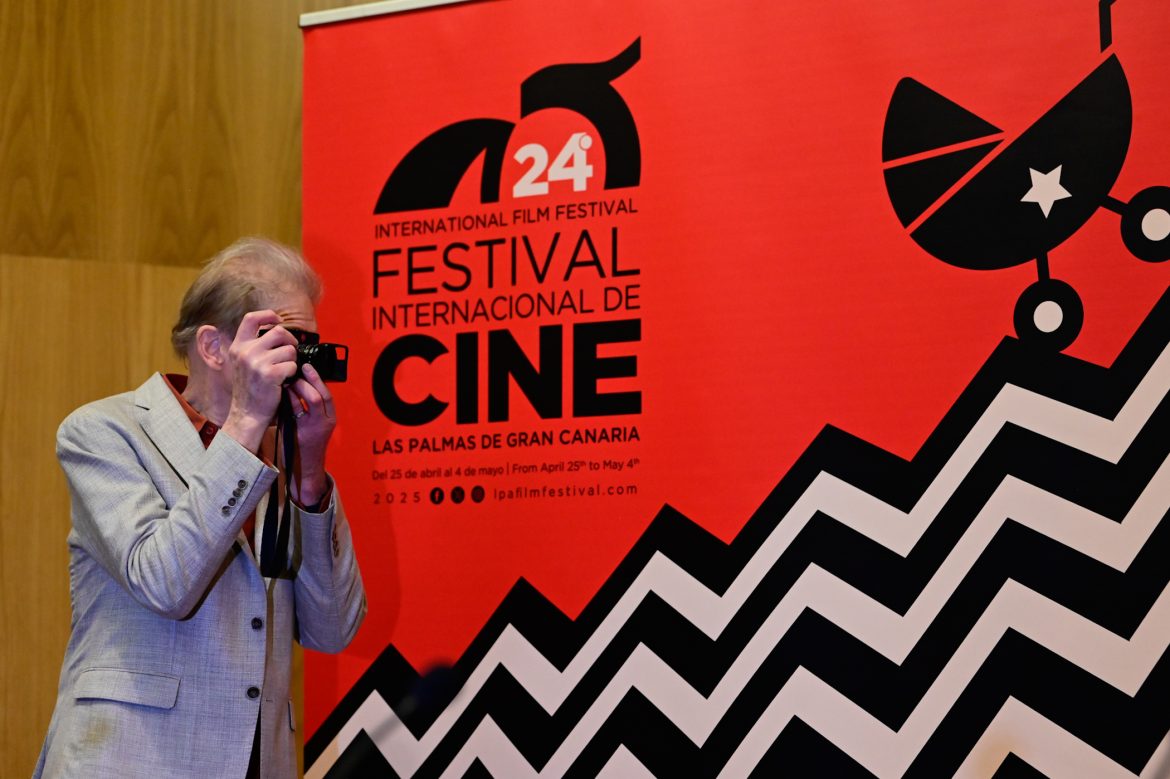• Film critic and writer Quim Casas describes the American filmmaker as a true Renaissance man, to whom the Festival has dedicated a retrospective this year: “The best thing you can do with Lynch,” he advises, “is to let yourself go, avoiding any kind of logical analysis towards his films”
• Accompanied by Luis Miranda, Frederick Elmes and Quim Casas will talk with the audience who managed to get a ticket for tomorrow’s screening of Blue Velvet, at 8 p.m.

25.04.24 Frederick Elmes. Alfredo Kraus Auditorium. Pictures by Tony Hernández
Las Palmas de Gran Canaria, Friday, April 25, 2025.- The Las Palmas de Gran Canaria International Film Festival, which has already started this Friday, April 25, has reserved a special place in its 24th edition to American filmmaker David Lynch. The Festival pays tribute to the unique artist from Missolua (Montana, USA) with a wide retrospective and more than a nod in its official poster: Twin Peaks’ iconic black and white flagstone pavement. And within this tribute what better way of accompanying the screenings than by bringing in one of his closest collaborators, cinematographer Frederick Elmes. He spoke to the media in a press conference held at the Alfredo Kraus Auditorium alongside the director of the LPA Film Festival, Luis Miranda, and film critic Quim Casas, who’s also written an essential book in Spanish on Lynch’s filmography (David Lynch, Cátedra, 2007)
After introducing the feature film opening the retrospective this evening, Eraserhead, the three of them will have a talk tomorrow, Saturday 26, prior to the screening of Blue Velvet, scheduled at 8 p.m. at the Lynch Room
Elmes, whose job was essential to creating an absorbing film atmosphere in features like Eraserhead, Blue Velvet or Wild at Heart, highlighted Lynch’s particular aesthetic vision and his powerful approach when trying to condition the audience’s mood. Something that has given his works an undeniable magnetism for audiences. The current edition of the Festival is not exempt from this situation: most of the screenings of its films are close to selling out.
Frederick Elmes considered “such an honor” to be at the Festival. “It’s wonderful to be in a new city, in a new place, in a new culture for me, and to talk about a thing that I love, making movies,” he pointed out. “And it’s very important to me to talk about David Lynch, the films we made together, and his legacy and influence on the film industry.”
“David made,” he continued, “very particular films, and he had a very special style. His films are not really for everyone, though some are more accessible than others.” Along these lines, he also noted that The Elephant Man, for instance, “is quite brilliant. Some films are more understandable, more traditional in their structure, and some are not, some are very particular, and I think it were those particular elements that David brings to filmmaking that attracted me to him.”
Elmes met Lynch when they both were very young, at the American Film Institute. “We had kind of an immediate bond: our curiosity about images, our curiosity about creating, in David’s words, kind of a painting that moves,” he recalled, “of this world that we’re creating, and bring those elements together in a way that a traditional movie didn’t do.”
It was that bond that made possible their professional collaboration in different productions. The cinematographer shared some anecdotes of his work with the unique filmmaker that give an insight into his personality. Like when, during a shooting, he moved an object on the table to make a composition more perfect for him “and David looked at me and he said: We don’t move things on the set, this is where it belongs, you’ll photograph it where it belongs… So he had a very particular vision that I learned to interpret, I learned to really do it his way, and I think that that joining of our personalities and our tastes is what helped make some of those films what they are.” Or like during Eraserhead’s shooting, when one of David’s favorite lines was “you know, Fred, I still see some detail in the shadows, it should be dark, it should be really black over there, I don’t want to see anything. Which was scary for me,” he admitted, “because I’m trying to light things and make them come up on the film, and David is saying no, it’s better if it’s dark, if better we don’t know what’s over there.” Elmes also revealed that he could not work in Twin Peaks, “a wonderful mystery that changed television in many ways,” because he was filming Wild at Heart.
Elmes explained that Lynch “kept talking about the mood, the mood had to be correct, but he left it to me to get there, to find it, which was wonderful and created freedom for me because I could express myself and still create an image that David was pleased with.” He was able to do it not only in three feature films, but also in some shorts and even in some commercials for Calvin Klein or Yves Saint Laurent, to name a few.
Regarding his long professional career, the cinematographer noted the difficulties he had when shifting from 35 mm film to digital photography (“it was a bump”), although he has used both and interchanged between them.
For Elmes, the complexity of storytelling remains a challenge because “when you start to make a film, for instance, you start with the pages of the story and the script and you watch it unfold and develop and become real.” From the perspective of a true artist, he thinks “that remains the same, those are very important tools that we learned in making movies and that we only really get better at.”
Before Elmes’ intervention, Luis Miranda, the director of the Las Palmas de Gran Canaria International Film Festival, remembered Lynch’s passing last January and revealed that “we knew we had to dedicate him a special space, and the truth is that little by little it has taken over the Festival: Lynch represents something very special for us, at least for those of us who belong to a certain generation.”
Miranda pointed out that the American filmmaker “has shaped our sensitivity. He has changed our way of looking at things, really, and his cultural influence goes far beyond what is possible to measure. And besides, he’s been a fantastic filmmaker.” That is, “a master making movies,” hence his happiness about “the great fortune of being able to have here one of his key collaborators, Frederick Elmes.”
Miranda also mentioned the cinematographer’s professional career, during which he has collaborated with other directors such as John Cassavetes, Jim Jarmusch or Ang Lee. And from Quim Casas he emphasized his role as film critic and writer, as well as a book about Jarmusch the Festival commissioned him years ago: “His work,” he said, “is essential to the understanding in Spanish of David Lynch’s filmography.”
Casas, a special guest at the press conference, claimed that “if you asked me now who are my ten favorite film directors, I’d say that three of them are David Lynch, Jim Jarmusch and John Cassavetes. And Frederick Elmes has worked with all of them, so you can imagine what an honor it is for me to be sitting here, next to him.” Regarding Lynch, he recalled an interview in which the filmmaker explained to him “in a pretty clear way that ideas are floating in the air, it’s only a matter of knowing how to catch them and capitalize on them.”
The writer maintains that in David Lynch’s work “Blue Velvet marks a before and after, he made it after Dune’s commercial failure, and with it he regained his touch as a filmmaker.” And, above all, Casas believes that “there has been no one from the second half of the 20th century onwards who embodies as much and as well the idea of the renaissance artist” as Lynch. “Because he didn’t just make movies,” he explained, “he made movies, television, music… He had industrial blues albums, pop, dream pop. He painted, photographed.” Futhermore, he continued, “I think he is the filmmaker who best understood the Internet’s possibilities, when everybody else was looking at the net as a threat. He created his own website, where he made lots of short films as experimental pieces. And his famous weather report.” Lynch even “made commercials, videoclips, installations, furniture design… He touched practically all areas and always in a very coherent way.”
Casas also recalled that Lynch used to say that he “started to make cinema because he wanted to bring volume and sound to his paintings.” For the writer, “the best thing you can do with Lynch is to let yourself go, avoiding any kind of logical analysis towards his films. That’s how we can understand that in Lost Highway, for example, a character is in prison one day, and then the following day there’s another one in the same cell. Or what happens inside the mind of the protagonist of Eraserhead, or in Lumberton, Blue Velvet’s town. Or the whole Twin Peaks universe.”
Every one of these twists and settings are present in the Lynch – Walk With Me section, which holds a significant space in this current edition of the Las Palmas de Gran Canaria International Film Festival. His ten feature films, six short films and four Twin Peaks episodes screening at Cine Yelmo Las Arenas thanks to SkyShowtime’s collaboration have already proven their appeal to the audience with several sessions already sold out.
The Las Palmas de Gran Canaria International Film Festival, organized by the Culture area of the Gran-Canarian capital’s City Council through Promoción de la Ciudad de Las Palmas de Gran Canaria, has received public assistance by the ICAA [Institute of Cinematography and Audiovisual Arts], the Visitors’ Program for the Internationalization of Spanish Culture (PICE), of the Spanish Public Agency for Cultural Action (AC/E), as well as public support from Promotur Turismo Islas Canarias.
Among the Festival’s collaborators we may find Fundación Auditorio Teatro, Cines Yelmo, Las Arenas Shopping Center and Hotel Cristina by Tigotan, places which also function as venues or hold activities of the film event; as well as other institutions and companies such as Sagulpa, Toyota, Royal Bliss, Fuze Tea, Coca Cola, Sholeo Lodge, Audiovisuales Canarias, Music Library &SFX, Blackout Films and International Bach Festival. Likewise, its market, MECAS, has been possible thanks to the sponsorship of the Gran Canaria Film Commission-Sociedad de Promoción Económica de Gran Canaria and the support of Proexca.
The University of Las Palmas de Gran Canaria, the Mid Atlantic University, Digital 104, the Audiovisual Cluster of the Canary Islands, the Association of Women Filmmakers and Audiovisual Media CIMA, the Cartagena International Film Festival, the Gijón International Film Festival, the Barcelona Independent Film Festival, the Tres Puertos Laboratory, Barcelona’s ESCAC, and Very Good Script, Freak World and Fimucité are also collaborators.
Share this Post

